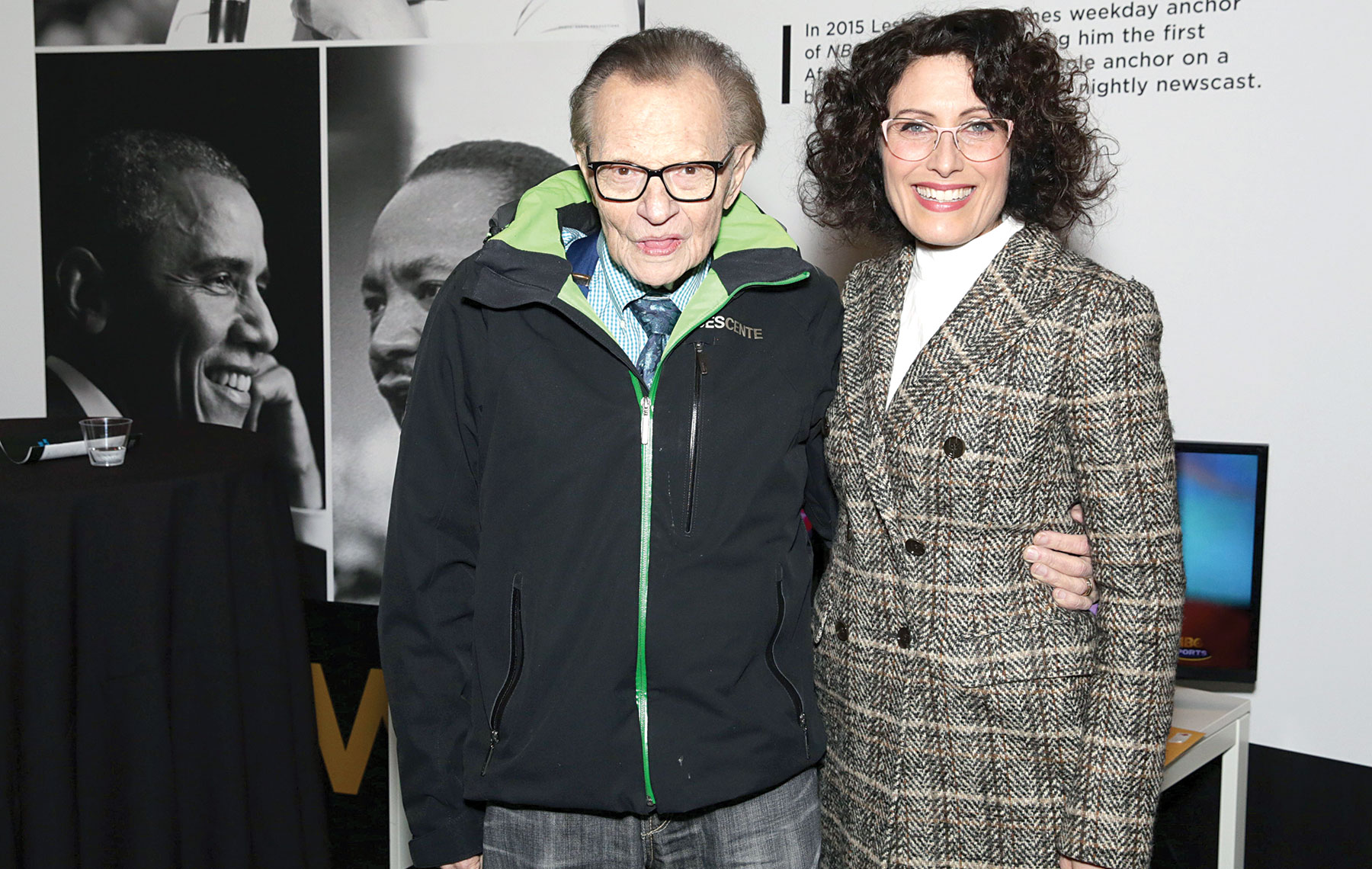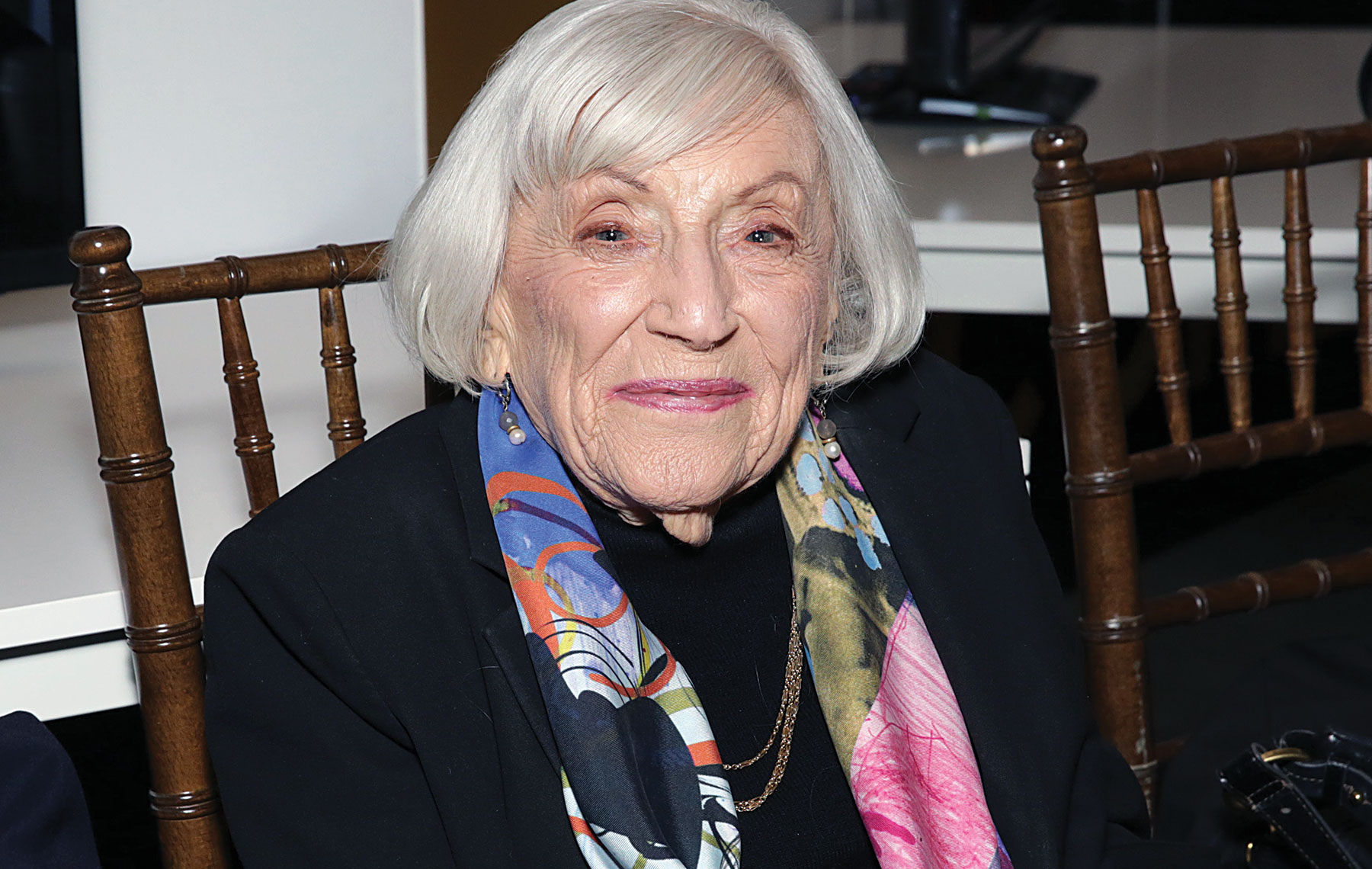 Larry King (moderator) and Lisa Edelstein (moderator)
Larry King (moderator) and Lisa Edelstein (moderator) After conducting more than 50,000 interviews with world leaders, dignitaries and celebrities, Larry King may have met his match last month in Marthe Cohn, a 98-year-old woman who stands barely 5 feet tall and admits to a certain amount of hearing loss.
After Cohn regaled an audience at the Paley Center for Media in Beverly Hills about her years spying for the French military during World War II, King — who was moderating the panel — exclaimed, “Don’t mess with this lady. This is some lady.”
The documentary about Cohn’s life, “Chichinette — How I Accidentally Became a Spy” was one of four films highlighted at a cultural event sponsored by the Conference of Jewish Material Claims Against Germany (aka the Claims Conference). Where many conventional film festivals are held solely for purposes of entertainment, “Eyewitness: Documenting the Holocaust on Film” had a different agenda: remembrance and desperately needed awareness. Survey data collected by the Claims Conference indicates that 22 percent of millennials have never heard of the Holocaust while nearly 50 percent of Americans cannot name the location of a single concentration camp.
“The most common comment I get from Holocaust survivors these days is a simple request: please do not forget us,” Greg Schneider, Claims Conference executive vice president said during his introductory remarks. “As long as there are filmmakers who can tell the history and stories that must be told, we will help. We will help you tell them. That’s why we are here tonight.”
Filmmakers from the four documentaries — each of which received Claims Conference funding — emphasized that his or her work offered a slightly different perspective than viewers might get from a Holocaust-themed film. Roberta Grossman’s “Who Will Write Our History” focuses on the secret band of journalists, scholars and community leaders in the Warsaw Ghetto known as the Oyneg Shabes who took up their pens to confront Nazi lies and propaganda. With “Chasing Portraits,” Elizabeth Rynecki documented her efforts to recover the artwork of her great-grandfather Moshe, that was lost during the war. And in “The Liegnitz Plot,” longtime TV writer and producer Gary Gilbert undertakes a quixotic quest to recover a priceless stamp collection stolen from concentration camp victims that Gilbert and director/producer Dan Sturman are convinced is buried in the basement of a house in Poland.
“Invariably, the discussion turned to awareness and to whether a genocide comparable to the Holocaust could happen today. Even in a world where the rise of digital media would make concealing such an act difficult, Grossman believes it’s possible.”
A five-minute clip from each film preceded the four panels. In addition to the filmmakers, the Eyewitness panels featured historians, subject matter experts and Holocaust survivors. King, who has worked with the Shoah Foundation, moderated the “Who Will Write Our History” and “Chichinette” panels; actress Lisa Edelstein led the conversations for “Chasing Portraits” and “The Liegnitz Plot.”
“Who Will Write Our History” is currently in theaters and “Chasing Portraits,” which has been shown at multiple festivals, has been acquired by First Run Features. The filmmakers emphasized the importance of their stories reaching audiences so that they could help to serve the mission of the Claims Conference and bring untold stories of the Holocaust to light.
Rynecki’s story documents a personal journey — an attempt both to recover her great-grandfather’s artwork and to heal a portion of the existing relationship with her father. “Chasing Portraits” took 10 years to make, according to the writer-producer-director. Rynecki insisted she is “not a filmmaker. I made this film because I had a story to be told. … “The survivors are dying and I knew that I couldn’t bear witness because I wasn’t there. It’s both a burden and a total honor to be able to tell those stories and to share them with others.”

former spy).
“The Liegnitz Plot” came about after Gilbert decided to investigate the story of a Nazi who was skimming stamps intended for Adolf Hitler. Gilbert said he felt he had a moral obligation to make his film. “In a way this movie honors the 6 million people who couldn’t take the journey with me,” he said. “What could possibly be more important than this? I Lisa Edelsteincan’t fix anything. I can’t bring back those lives. All I can do is my little part.”Lisa Edelstein
“The Liegnitz Plot” is not yet finished and neither is Gilbert and Sturman’s quest. The filmmakers have contacted various museums and dreamed of ways to continue the story and perhaps make restitution to some of the victims. If even one missing stamp could be traced back and returned to the family of its original owners, the act would have significant symbolic meaning, Gilbert said.
“In my mind, there’s an old man, maybe he’s 90 years old, sitting in England. If we can show up and knock on the door and say, ‘Guess what? I can’t bring back your wife and your kids and all your neighbors. But this was a part of your life,’” Gilbert said. “As a collector, I know how important certain things are.”
Invariably, the discussion turned to awareness and to whether a genocide comparable to the Holocaust could happen today. Even in a world where the rise of digital media would make concealing such an act difficult, Grossman believes it’s possible. “Genocides still occur. I think there is something in our humanity that needs to be watched very carefully,” she said.
Survivor Natalie Gold, who lost 82 members of her family, had a firm answer when King asked her what action she would like to see audience members take after seeing a film like “Who Will Write our History?”
“Vote,” Gold said, drawing a round of applause from the audience. “Vote the bastards out when they get in.”






















 More news and opinions than at a Shabbat dinner, right in your inbox.
More news and opinions than at a Shabbat dinner, right in your inbox.